- Home
- Howard Jacobson
Whatever it is, I Don't Like it
Whatever it is, I Don't Like it Read online
Whatever It Is,
I Don’t Like It
Howard Jacobson
Contents
Cover
Title Page
Dedication
Epigraph
Introduction
The Sultan’s Elephant
The Effing Icelandic Volcano
Libraries
The Part of Me That Is Forever Cosa Nostra
Juicing
Books Are Bad for You
The Twentieth Century? Tosh
The Chatfield Pant
‘Keep Smiling’ – Franz Kafka
Rigoletto
Pie Pellicane
Best Gig in Edinburgh
All at Sea
Corrugation Road
Suddenly I’m Homesick
Australian Hairdressers
O Sole Mio
Dining Out Solus
Freed from Rage
Blubber
Giselle
Holiday Reading
Pity the Poor Porkers and Damn the Swine That Gave Them Fever
Death of Dudley
Cherie Baby and the Bombers
Human Values
Girls Will Be Girls
Me Ol’ Bam-Boo
Travis
Loving the Inchoate
Bad Time of the Year
Every Day Is Father’s Day
In Defence of Melancholia
Jordan or Iraq
The Great Chain of Being
Auschwitz
Gay in the Judy Garland Sense
Wherefore Art Thou Charlie?
Nates
The Full Monty
Tomorrow and Tomorrow and Tomorrow
The Greatness of Philip Guston
Darts and the Man
Everyone’s Gone to the Moon
Good for You, Bad for You
Anyone Speak English?
Friendly Banking
O the Opal and the Sapphire of That Wandering Western Sea
Unconditionality and Murder
What Things Are For
How to Upset a Millionaire
Dying Like a Gentleman
Death of Alma
Some of His Best Friends
The Grave Question of the Bicycle
Blunkett in Love
Porn for Royals
Like-Mindedness
Mind Your Own Business
The Egotism of the Terrorist
You Cannot Have a Margin Unless You Have a Centre
God and Blokes
Thou Shalt Not Know What One Is Talking About
Alida Valli and the Eroticism of the Raincoat
Dott and Sympathy
It Don’t Mean a Thing if It Ain’t Got That Swing
If It’s ‘Readable’ Don’t Read it
Hodgepodge
Tristan and Isolde
Natural-Born Killers
What if Joseph K. Did It?
Be Very Afraid
Art for Us
Vengeance Is Mine
‘A Gentle Vacancy of Spirit’
What Are They Saying?
Leonard Cohen in Concert
Noe-Beaver
The Last Cigarette
Savage Torpor
Pinteresque
Washington I
Washington II
Elitism for Everybody
Glue Sticks and Human Rights
Dad Skills
Man Booker
A Note on the Author
By the Same Author
Imprint
For Ziva
Groucho Marx: I’ve got something here you’re bound to like. You’ll be crazy about it.
Chico Marx: No, I don’t like it.
Groucho Marx: You don’t like what?
Chico Marx: Whatever it is, I don’t like it.
A Night at the Opera
Introduction
What follows is a selection of the columns I have been writing for the Independent since 1998. The title, Whatever It Is, I Don’t Like It, might be asking for trouble, as it suggests a querulousness which I don’t in all honesty lay claim to. There is a great deal that I do like. But it isn’t in my nature to be non-confrontational, and these columns have, I hope, been amicably provocative from the start – picking a fight with those who make the world more sanctimonious, more foolish and, in every sense, more impoverished than it needs to be, while at the same time expecting to be read in a spirit of good-hearted amusement. It matters to me to be entertaining. Some would say it matters too much. But I don’t have any story to break or any information to convey; I am a stranger to the current affairs agenda; and I don’t see myself as an opinion former.
Novelists are not here to have opinions; our job is to submit opinion to the comic drama of ambiguity and contradiction, and I have all along conceived these pieces as more like little novels than articles – flights of fancy, tales of misadventure, character sketches, pauses for reflection, eulogies to those I admire and farewells to those I have loved. Some read like conversations, assuming a commonality of seriousness and exasperation between the reader and the writer that underlies whatever laughter we share.
I have been guided in my choice of which columns to reprint by no principle other than pleasure – the pleasure I recall taking in the writing of them and the pleasure I was assured they gave to those who read them. It is for this reason that I have not dated them or – except in the case of a small number that were written when I was travelling in Australia – grouped them according to subject or chronology. Each stands or falls on its own merits, self-revelatory, requiring neither context nor explanation.
Though some of the pieces are intimate – I do not conceal, for example, my passion for mafiosi shirts – this is not a memoir in another form. But a lot happens to a man in thirteen years. Thus the wife whose father’s ashes I helped scatter into the West Australian sea he loved is not the wife who, in a more recent piece, I feared was about to leave me for Richard Wagner. And some of the friends I wrote about in 1998 are no longer here in 2011.
To emphasise that these are celebratory no less than angry or satiric pieces, the collection begins with an account of a mechanical elephant taking over the streets of London: an event which I witnessed and recorded with nothing short of rapture.
Howard Jacobson
2011
The Sultan’s Elephant
We are entranced. We have not stopped smiling or looking dreamy for days. If you didn’t know us better you’d say we were in love, except that we are not suffering any of love’s unease. Not a condition we admit to very often in this column. As a rule we come to bury wonder not to praise it. In a childish world someone has to do the dirty business of growing up. But this week we have rediscovered the child in our self (that’s if you can rediscover what you never were) and are aquiver with enchantment. The Sultan’s Elephant is the cause. The mechanical contrivance, some fifty feet in height, complete with tusks and trunk and elephantine sadness, which roamed the streets of London for a weekend and stills roams the imaginations of those who saw it.
You will appreciate how beside our normal self we are when I say that we very nearly, for the duration of the elephant’s stay, got the point of Ken Livingstone. Loose of tongue, slack of jaw, lumbering of attitude and posture, careless of whoever gets in his way, and dangerous to lose one’s footing in the vicinity of – this is Livingstone I’m talking about, not the elephant – he nonetheless had the foresight to close central London to traffic for as long as it took the elephant to enjoy the city and the city to enjoy him, and for this, when he is consigned for all eternity to hell, I hope they give him the occasional cooling weekend off. Well, not weekend exactly; maybe half-hour
. And not too cooling. A man whose brain boils with the impetuosity of prejudice does not deserve in the next life the temperateness he declined in this. But then again, he did let us have the elephant.
Central London without traffic is a marvellous place. Elephant or no elephant, it would be good, now we have seen how well it works, to close London to traffic one day a week. The motor car is a neurosis not a necessity. Millions of people still found a way of getting in. Shops stayed busy, cafes still spilled their customers on to the streets, but the difference this time was that you could stroll the city rather than have to dodge it, and it’s only when you stroll a city that you truly enjoy its dimensions – the breadth of its boulevards, the plenty of its amenities, its rooftops, its vistas, and the easy companionableness, if you will only give them opportunity to express it, of its citizens.
If there was trouble on the weekend the Sultan’s Elephant came to London I didn’t see it. No one was competing with anybody: that helped. There was no trophy at stake. No tribe squared up to tribe. And no one plied us with liquor. But of course it was the elephant, ultimately – its pure, purposeless presence among us; street theatre without street theatre’s usual agitating agenda – that soothed the savage breast. All those other considerations helped, but what made humanity benign for an hour was the grandest toy any of us had ever seen.
There is something about an elephant that brings out the best in people, ivory collectors apart. It’s the size partly. As with whales and dinosaurs, the thought that life can fill up such a big space, that we share hearts and lungs with creatures built on such a scale, somehow aggrandises us. We want there to be life on Mars because we want Creation to be limitless. Looking at elephants or whales might not make believers of us, but we glimpse the grandeur of a creative impulse in them. What immortal hand or eye, and all that.
But an elephant isn’t only majestic by virtue of its scale, it is also tragic because of it. Or at least it seems so to us. It looks hard to be an elephant. We know how difficult it is to drag around our own tenements of flesh and we accept existence on the understanding it will not get easier. Elephants look old in body from the moment they are born. Their every step is weary. Hence, I suppose, the fantasies we weave about their inner life: each elephant a Proust in his own right, recalling his life history before he goes to sleep, retracing in his imagination his peregrinations from waterhole to waterhole, unable to bear the sight of ancestral bones when by chance he comes upon them, and reburying them with all due ceremonials and formalities, including, for all we know, elephant eulogies and hymns. Elephants break our hearts.
Why a toy elephant should have the same effect is hard to explain. The brainchild of Royal de Luxe, a theatre company based in Nantes, the Sultan’s Elephant – the idea for which is taken from a Jules Verne story, though narrative seemed beside the point – is an exquisitely conceived and manufactured puppet. It is entirely non-Disneyesque, not in the slightest cute or anthropomorphic, and postmodern in the sense that no attempts are made to hide its workings. Indeed, the Lilliputian-liveried men who pull its strings and drive its motors, and who are revealed within the elephant as it moves, are integral to what we feel about it. Emotionally as well as mechanically they serve the elephant’s inexplicable purpose. It is they who flap his suede ears, open and close his tired eyes, and twist his sinister, reticulated trunk. But what ultimately fascinates us about the Sultan’s Elephant is the part of him over which they have no control – his sense of being, as though the soul of living elephant has migrated into this wooden one.
Yes, yes, I know. But the truth of it is that I, like everyone else come out to have a quick look, felt bound to stay to have a second, and a third. In order to see him advancing towards us again we had to run ahead or find a short cut, nipping down alleys that connected New Regent Street to Haymarket, or Jermyn Street to Piccadilly, places we normally frequent only to buy shirts, then there he’d be, marvellous in his grave impassivity, as though the spoils of Empire had returned unconquered to reclaim the offices and citadels of imperial power. We watched as in a dream.
Don’t ask me what the children thought. Mainly, they cried when the elephant showered them with water, and otherwise, as far as I could tell, feigned delight because they knew delight was expected of them. Wasted on children, wonderment. You have to know why life is serious to know why sometimes it must be a toy. They marvel best who marvel least.
The Effing Icelandic Volcano
Heartbreaking tales all week of people trapped in their hotel swimming pools for up to five days. They say you could hear the wailing in the Givenchy Spa at Le Saint Geran, Mauritius, from as far away as the beach at Sandy Lane where word had got out – good that something had got out – that supplies of iced strawberries were running dangerously low. I can no longer watch the news on television, so heartbreaking are the scenes of couples reuniting who have not seen each other for seventy-two hours.
Yesterday, at the bar of the Groucho Club, I was embraced tearfully by an old friend I’d last talked to at the bar of the Groucho Club the week before.
‘I’m back,’ he told me.
I told him I didn’t know he’d been away.
‘Christ, man,’ he said, ‘the word “away” doesn’t get it.’
I wondered what word got it.
He told me what had happened. He’d been in Torremolinos with his family. When he said ‘family’ his eyes welled up. Had I not known his family I’d have pictured a tottering mother on a Zimmer frame, a wife already made weak by bulimia nervosa, and genius but fragile twins desperate to get back to a Mensa interview in London. In fact, his mother runs a major charity single-handed, his wife has completed six marathons this year, and his two boys had joined him after making their third successful assault on Everest without breathing equipment. He’d been in Torremolinos with them, anyway, paragliding, when he heard that no planes were leaving Malaga for the UK. He rang up Willie Walsh who was a personal friend, but Willie said there was nothing he could do, the effing Icelandic volcano having grounded BA more effectively than all the effing cabin stewards in effing Christendom.
I’m not saying this is how Willie Walsh actually speaks, only that this was how my friend reported him.
The barman at the Groucho asked us to tone down the swearing as other members of the club were offended by it. ‘Christ,’ my friend said, ‘do you know where I’ve been for the last four days?’
The barman shook his head, but when he heard Torremolinos he apologised. ‘Swear away,’ he said.
Unable to fly out of Malaga, my friend had shepherded his little family into a hire car for which the shysters were charging a thousand euros a day. For a Smart!
‘Christ!’ I said.
He put a hand over my mouth. ‘You haven’t heard the worst of it yet,’ he said. ‘We were told there were ferries leaving from Algeciras to Tangier, from where we could get a trawler to Lisbon, where a cargo ship was said to be leaving for La Coruña from which local fishermen were rowing stranded passengers to Roscoff from where light aircraft which could fly below the ash cloud were taking people to Cork . . .’
‘So what happened when you got to Cork?’ I asked.
‘Cork! Who said we got to Cork? The car broke down five kilometres outside Malaga. Do you know much it cost to get towed back to Torremolinos?’
I guessed a thousand euros an hour.
And back in Torremolinos? I expected him to say they windsurfed to Ibiza where they caught a pirate ship to Monaco where they hijacked a train heading for Luxembourg before terrorists attacked it in the Massif Central and kidnapped his mother. But only the windsurfing was right. Back in Torremolinos they had to go back to their villa and resume their effing holiday.
‘Christ!’ the barman said.
So I told them my story. Setting sail from Troy, I ran into a fierce north-easterly which carried me across the Aegean Sea to Libya where I’d heard there was a travel company called ‘Lotos’ which, while it couldn’t guarantee to get you ou
t made you very comfortable in the time you were there. Having a column to write in London, I went in search of other Englishmen as anxious to escape as I was, only to encounter a one-eyed giant called Polyphemus – I know, I know, but that’s foreign travel for you: you never know who you’re going to run into – whom I had in the end to blind to get away from. What happened next, to keep it brief, was that I managed to locate a tramp steamer headed for the Island of Dawn where I met the enchanting Circe with whom I am ashamed to admit I had a bit of a fling. Aware I could not afford to stay – her rates were a thousand euros a minute without kissing, and that was if she liked you – she pointed me in the direction of home, warning me to watch out for the Sirens, a sort of Girls Aloud of the Ionian Sea, though thankfully I was no more into their music than David Cameron, whatever he says to the contrary, is into Take That. Anyway, anyway, we all have our troubles, and mine finally ended when I arrived home, a little the worse for wear, after ten years of being away, and was able to massacre my wife’s suitors.
Ten years, mark! Ten years, not five days. What’s happened to our idea of what constitutes an arduous journey?
Don’t mistake me. We make light of no one’s travails in this column. Hell is other countries, airports are vile places, and I don’t doubt that many a stranded passenger had pressing reasons to be back. But if you want to experience real travel nightmare try getting from Soho to Swiss Cottage. The horror of the London Underground has been well documented – if you’re not blown apart by jihadists, or pushed on to the rails by homicidal maniacs on day release, or trampled by bored French schoolkids, you suffocate – and the overground is worse. Despite Boris Johnson’s promise to bring back buses fit for humans to travel on, they remain the Legoland suspensionless boneshakers they were, with nowhere to sit unless you go upstairs and you can only get upstairs if you’re a gymnast. London roads are now an obstacle course: if you can find a road that isn’t closed for the installation of new water pipes or Crossrail, you can be sure it will be potholed, or made impassable by bumps they have the effrontery to call traffic calmers. What’s calming about driving over hummocks? What’s calming about breaking your spine? Has anyone met a calm London cabbie? London at this minute is in the grip of a road-induced collective nervous breakdown, and yet people are being winched aboard Royal Navy Chinooks in order to get back. Explain that to me, someone.

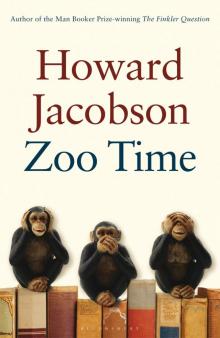 Zoo Time
Zoo Time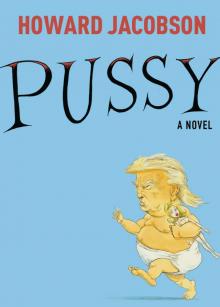 Pussy
Pussy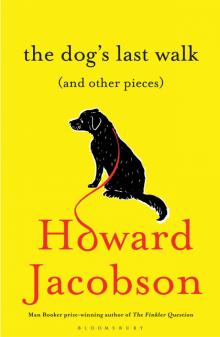 The Dog's Last Walk
The Dog's Last Walk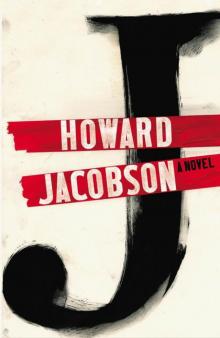 J
J Shylock Is My Name
Shylock Is My Name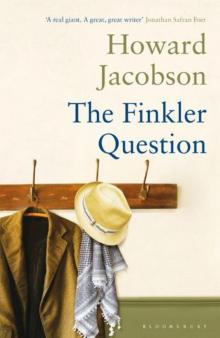 The Finkler Question
The Finkler Question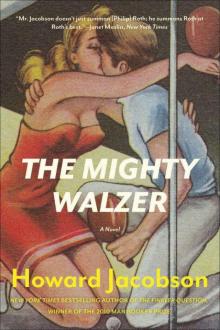 The Mighty Walzer
The Mighty Walzer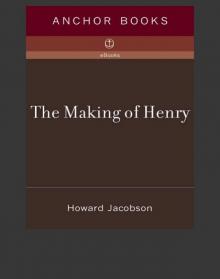 The Making of Henry
The Making of Henry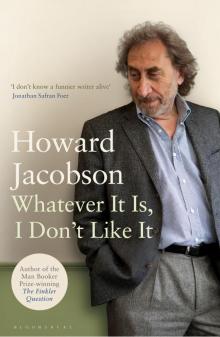 Whatever it is, I Don't Like it
Whatever it is, I Don't Like it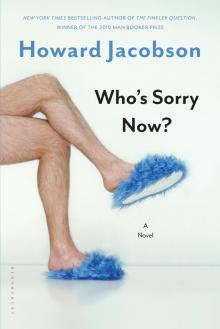 Who's Sorry Now?
Who's Sorry Now? Kalooki Nights
Kalooki Nights